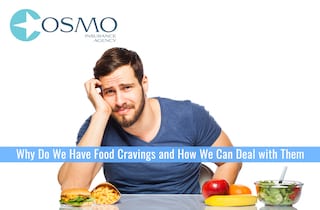What do all of these things have in common: french fries, cupcakes, cookies, pasta, pizza and bread? They all fall in the category of foods we crave. A craving is defined as a powerful desire and when it comes to food, almost everyone has had a first-hand experience. Let’s unpack the science of cravings.
Physical or Psychological?
Despite a popular theory suggesting that cravings are related to nutrient deficiencies, there’s scant scientific support for this notion. That may explain why you’re unlikely to hear chatter about craving chickpeas, despite the fact that this food will supply fiber, magnesium, potassium, iron and folate — nutrients that are often shortchanged in an American diet. Still, cravings are partly driven by nature and partly by nurture.
Here’s where the physical part comes in: Processed foods are craved more often than natural, whole foods because they’re more reinforcing. Research shows that high fat, high carbohydrate foods (think: ice cream, French fries, pizza, cookies, mac and cheese, cakes) light up reward circuitry in our brain more than foods that are either high in fat or high in carbs (as nature might supply them) — and more than you’d expect given people’s stated liking for those foods. Other research suggests that sugar acts on similar pathways in the brain as addictive substances, which would explain some of our cravings, binging behaviors, and use of food as a reward.
Just think: Eating plays a central role in just about every major life event, social activity and religious ceremony so food is very intertwined with emotions and culture. We start to associate good feelings with the food that takes center stage in these moments.
But we also form habits around food and unpleasant feelings. Breakup? Fight with a friend? Bad day at work? We want these feelings to go away ASAP! Since food can light up pleasure centers in our brain, we might make ourselves feel good with rewarding foods and then another association is formed (bad feeling + rewarding food = momentary good feeling).
How to Manage Cravings?
Experts caution against severely restricting your favorite foods since it can ultimately take a toll on your emotional health. If you deem M&Ms totally off-limits, the decision-making part of your brain has to work really hard every time you pass a vending machine, go through a checkout (whether at a grocery store, convenience store or drugstore), attend a party or work event, etc. All of the sudden, it seems like M&Ms are everywhere and you have to make a conscious decision to avoid them each and every time. This type of mental workout is draining, causing some people to throw in the towel and overeat, which may lead to feelings of guilt and shame.
Instead of giving your willpower that kind of demanding workout, one well-studied approach to handling cravings is to develop a mindfulness practice. At the root, mindfulness is the practice of being present in the moment, and studies suggest it can help reduce emotional eating, manage cravings and put us in better control of our impulses around food. It can also increase our enjoyment of food. If you’re struggling with food cravings, here are some tips you can try today.
1. DEVELOP MORE AWARENESS
You can practice being mindful anywhere — when you’re hanging out with your family, put your phone down and engage in the moment more. When you’re participating in yoga, don’t let your mind wander and let go of any agenda you have to hold a pose for a certain amount of time or be as flexible as the person in a pretzel next to you. When you’re eating, put your fork down between bites, and ask yourself what your food tastes like. Notice if it’s crunchy, sweet, mushy. Chew thoroughly, and spend a moment taking in the sensations and experiencing the flavor. You can strengthen your mindfulness practice through breathing exercises and guided meditation.
2. LISTEN TO YOUR BODY
We talked about all the reasons we eat (joy, stress, social cues, etc.), but plugging in to your body’s signals can help you recognize what’s happening in the moment. Do you have physical signs of hunger, such as a growling stomach or an empty feeling in your belly? Are you bored? Uncomfortable? When you’re attentive, you can uncover some of the feelings that are present and notice when you’re eating because you’re physically hungry and when something else may be overriding your body’s own hunger and fullness signals.
3. GET COMFORTABLE WITH FEELING UNCOMFORTABLE
Sometimes we eat to blunt uncomfortable feelings. Remember, we want bad feelings to disappear and a quick and easy way to usher in some good feelings is to eat highly rewarding foods. But forcing our feelings off to the side doesn’t really address them. Studies suggest that a mindfulness meditation practice can help you observe these emotions without reacting to them, which can put you in a better frame of mind to cope with your emotions. This awareness will also help you reduce the urge to distract yourself with food.
Cosmo Insurance Agency is an independent insurance agency serving surrounding communities in New Jersey. Cosmo keeps its promise to assure an efficient and creative approach to the services we offer. Each of our clients experience a personalized and long-term relationship with us. Our New Jersey based team of health brokers guides our clients in helping them choose the most cost-effective options. By incorporating the latest in technology-based tools and laws on healthcare, employee benefits, life insurance and finance, we keep our clients up-to-date with the plans that encompass all of their needs, whether it is individual or group insurance.
CONTACT COSMO NOW
GET A HEALTH INSURANCE QUOTE NOW
LEARN MORE ABOUT HEALTH INSURANCE
GET A DENTAL INSURANCE QUOTE
